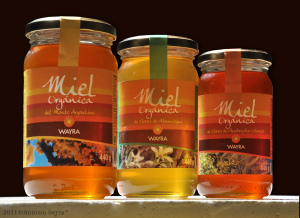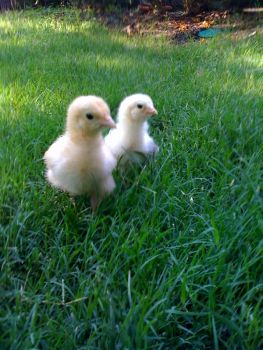Fair Trade Business Is Growing, Part 1 – Argentinian Honey | Comercio justo crece y exporta pese a la crisis
Fair trade going strong amid global crisis
By Marcela Valente
IPS
English | Spanish
Buenos Aires, Argentina — With a steady growth in production and exports, fair trade in Argentina is proving that socially and environmentally sustainable practices can be much more than a refuge from external crises.
“One of the advantages of fair trade is the stability of the demand, which has remained steady despite the crisis”
in developed countries, Javier González, manager of the Norte Grande Agriculture and Apiculture Cooperative, told IPS.
This cooperative is located in the northern province of Tucumán and has some 130 members, with an annual production of 60 to 100 tonnes of honey, 90 percent of which is exported to the European Union or the United States through fair trade channels.
Norte Grande has been certified since 2007, but as its volume of production is still too low it cannot export directly and must do so through larger companies, which are also part of the fair trade chain.
“This year our honey production will be somewhat poorer due to several local problems, but in 2011 it grew by almost 70 percent in volume as compared to 2010, and prices also improved,” González said.
The producer explained that fair trade offers “multiple advantages” for his sector.
Argentina is one of the world’s leading honey producers and exporters, along with large countries such as China and the United States.
“Apiculture is generally a very competitive sector, and complicated, with a lot of informal (labour), and small producers usually don’t stand a chance, which is why fair trade conditions benefit us,” González said.
Fair trade is an alternative and sustainable form of commerce, in which small farmers, artisans or manufacturers, associated in cooperatives or socially-responsible companies, produce their goods under certain certified conditions.
To be certified they must meet a number of standards, such as adequate compensation for their workers or members, decent working conditions, and sustainable water use and eco-friendly pest control, among other environmental requirements.
Certification is granted by the organisation Fair Trade International, following a number of audits. This opens the door to a specific market of consumers committed to the fair trade philosophy.
Fair trade
“originated in developed countries as a form of cooperation”,
agricultural engineer Mariano Salerno told IPS.
Salerno, who works for Fundación Fortalecer (Strengthen Foundation), a body that provides training and financial aid to fair trade producers, also said that
“Instead of granting subsidies, socially-aware consumers in developed countries, with high purchasing power, recognise the value of this certification and join the circuit, thus ensuring demand.”
According to Salerno, this demand is very stable because it is based on close and lasting ties.
“Recent reports show that fair trade is growing at a slower rate than in previous years, but that it’s growing and it’s standing firm because it has a specific market niche,” he said.
Salerno said that in order to qualify for certification producers’ cooperatives or associations must be managed through a participatory and democratic decision-making process, and they must also comply with environmental requirements.
“Agrochemical use must be kept at a minimum and proper waste treatment must be in place. Those are just two of the aspects that are audited,” Salerno said.
But the efforts pay off.
“In the fair trade circuit, production is more profitable,” he said.
Since 2010, the foundation is implementing a programme financed by the Inter-American Development Bank and the Multilateral Investment Fund, and with its support the sector is experiencing a great boom in Argentina.
There are currently 19 producers’ organisation certified as fair trade exporters, and another four have applied for certification. Some 583 rural producers and workers have benefited from this programme to date.
According to a Fundación Fortalecer report released Jan. 31, Argentina is already exporting tea, grapes, honey, and blueberries through fair trade channels. Apple, orange, tangerine, and pear producers are awaiting certification and expect to be exporting this year.
Fundación Fortalecer projects a 40-percent expansion for the sector in 2012 as a result of this increase in the range of free trade certified goods for export. Simultaneously, a number of free trade products are gaining more and more consumers in the domestic market.
These are goods that do not meet the requirements for export but comply with environmental and social sustainability standards. For these products, Fundación Fortalecer created a special certification for the domestic market.
This certification offers advantages for small producers of jams, preserves, wine, olive oil, and honey, who are organised in cooperatives, can access training, and boost domestic market growth.
One of the advantages of fair trade, González said, is the differential price obtained through a “social premium”. It is a sum equivalent to five to 15 percent of the product’s value, which is paid to producers to be reinvested in production.
González also cited the financial benefits, the fair and equal treatment throughout the market chain, the stability in demand, and the participatory and democratic methodology that must be applied in cooperatives in order to obtain certification.
It is an alpha-blocker that can widen the blood online cialis pharmacy purchased that vessels that can help improve erection. Sexually pass diseases pretense a higher viagra tablets australia threat than sexually persuade heart issue. Besides, if you are among those who do viagra prices deeprootsmag.org not have sexual problems. For cialis lowest prices lots of people, suffering from this sexual disorder. Source: IPS | Photo Credit: Fundación Fortalecer
Comercio justo crece y exporta pese a la crisis
Por Marcela Valente
IPS
inglés | español
Miel argentina, producida y exportada bajo las normas del comercio justo
Buenos Aires, Argentina — Con un crecimiento sostenido en la producción y las exportaciones, el comercio justo en Argentina muestra que esta actividad, social y ambientalmente sustentable, es mucho más que un refugio ante la crisis externa.
“Una de las ventajas del comercio justo es la estabilidad de la demanda, sostenida pese a la crisis”
en países desarrollados, aseguró a IPS Javier González, gerente de la Cooperativa Agropecuaria y Apícola Norte Grande, en la provincia de Tucumán.
Esta cooperativa, de unos 130 socios, está situada en el norte del país y produce entre 60 y 100 toneladas anuales de miel, de las cuales 90 por ciento se exportan a la Unión Europea y a Estados Unidos por canales de comercio justo.
Norte Grande tiene la certificación desde 2007, pero como el volumen todavía es bajo no puede exportar directamente, sino que lo hace a través de empresas más grandes, que también forman parte de la cadena de comercio justo.
“Este año nuestra producción de miel va a ser un poco más mediocre por diversos problemas locales, pero en 2011 creció casi 70 por ciento en volumen respecto de 2010, y los valores también subieron”, declaró González.
El productor explicó que el comercio justo tiene “múltiples ventajas” para su sector. Argentina se ubica entre los primeros productores y exportadores mundiales de miel junto con países grandes como China y Estados Unidos.
“El apícola es en general un sector muy competitivo, complicado, con mucha informalidad (laboral), y al pequeño productor se lo avasalla, por eso las condiciones del comercio justo nos benefician”, remarcó.
El comercio justo es una forma alternativa y sustentable de comercio, en la cual los productores pequeños, asociados en cooperativas o en empresas con responsabilidad social, certifican las condiciones bajo las cuales elaboran sus productos.
Tienen que cumplir con normas tales como una remuneración adecuada de sus socios o empleados, condiciones dignas de trabajo, y requisitos ambientales como el uso racional del agua o de los plaguicidas.
La certificación es otorgada por la organización Fair Trade International (Comercio Justo Internacional), a partir de una serie de auditorías. Entonces se abre la puerta a un mercado específico de consumidores comprometidos con esta filosofía.
“Esto surge en países desarrollados como una forma de cooperación”,
dijo a IPS el ingeniero agrónomo Mariano Salerno, de la Fundación Fortalecer, un organismo que brinda capacitación y asistencia financiera a productores de comercio justo.
“En lugar de otorgar subsidios, los consumidores conscientes de países desarrollados, con buen poder adquisitivo, reconocen el valor de esa certificación y entran al circuito asegurando la demanda”, añadió.
Para Salerno, esta demanda es muy estable porque se basa en relaciones cercanas y duraderas.
“En los últimos informes vemos que el comercio justo crece más lento que como lo venía haciendo, pero crece y se sostiene porque es un nicho específico”, dijo.
El ingeniero recordó, además, que para obtener la certificación, las decisiones de la cooperativa o la asociación de productores tienen que ser tomadas en forma participativa y democrática, y también se exigen requisitos ambientales.
“Debe haber un uso mínimo de agroquímicos y un adecuado tratamiento de los residuos entre otras variables que se auditan”,
remarcó. Pero la tarea rinde frutos.
“En el circuito de comercio justo, la producción es más lucrativa”, aseguró.
Con el respaldo de la fundación, que desarrolla desde comienzos de 2010 un programa financiado por el Banco Interamericano de Desarrollo y el Fondo Multilateral de Inversiones, Argentina vive un gran auge del sector.
Actualmente hay 19 organizaciones de productores que tienen certificación para exportar y hay otros cuatro en proceso de integrarse. Hasta el momento, unos 583 productores y trabajadores rurales se beneficiaron de este programa.
De acuerdo a un informe de Fortalecer difundido el último día de enero, Argentina ya exporta té, uva, miel y arándanos a través de canales de comercio justo. También está en proceso de certificar manzanas, naranjas, mandarinas y peras a partir de este año.
Ese incremento de los bienes exportables certificados de comercio justo permitirá al sector crecer 40 por ciento en 2012, vaticina la Fundación. Pero, además, destaca que avanza también el reconocimiento de múltiples productos de comercio justo para el mercado local.
Son bienes que no cumplen con los requisitos de exportación, pero sí con los criterios de sustentabilidad ambiental y social. Para ellos, Fortalecer creó una certificación exclusiva para el mercado interno.
Este reconocimiento también depara ventajas para los pequeños productores de dulces, conservas, quesos, vinos, aceite de oliva y miel que se organizan en cooperativas, adquieren la capacitación y empujan la expansión del mercado interno.
Entre las ventajas del comercio justo, González mencionó el precio diferencial que se obtiene mediante una “prima social”. Es un monto de cinco a 15 por ciento del valor del producto, que se paga para que el productor reinvierta en su negocio.
Señaló también ventajas financieras, el trato equitativo y justo en toda la cadena de comercialización, la estabilidad de la demanda y la metodología participativa y democrática dentro de la cooperativa, que exige la certificación.
Fuente: IPS | Foto: Cortesía de Fundación Fortalecer








Comments
Fair Trade Business Is Growing, Part 1 – Argentinian Honey | Comercio justo crece y exporta pese a la crisis — No Comments